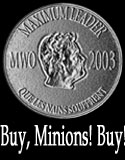I frequently see complaints that the mainstream media is to blame for declining American support for the Iraq War. This isn’t new - the same complaints were made during Vietnam.
In both cases, the complaints are wrong. Obviously so.
Folks who scream that the mainstream media ought to do more stories on distributing notebooks to Iraqi schoolchildren and less on the ongoing unrest. Ignoring the insurgency doesn’t make the insurgency vanish, reduce casualties, or make the people of Iraq believe in secular democracy.
If the insurgency was vanishing, casualty rates are falling, and the inner American inside every Iraqi was popping out, there wouldn’t be unrest to report.
If the administration’s statements to the public had been accurate, the war would be over and we would all rejoice.
What statements, you ask?
Mission accomplished.
Bitter enders.
Last throes of the insurgency.
Violence is increasing because the insurgents think we are winning.
Suicide attacks have increased because the surge is working.
Okay, that last one was from Lieberman, who is not (technically) a member of the administration.
When the American public has been told for four years that victory is at hand and that there is light at the end of the tunnel, they start to suspect that their leaders are not being straight with them.
If the leaders have been wrong every time they prematurely claimed victory, then perhaps we ought to view their future judgments skeptically.
If the leaders have understood that the occupation is going to be a long haul and lied about it, then people ought to be free to make new judgments about the worthiness of the cause and whether the sacrifices we are asking of the soldiers and their families are justified if they are going to continue indefinitely.
If the leaders have been lying all along, it also brings their judgment into question. To martial support for a long war in a democracy, you have to build public support. One way to do that is through shared sacrifice. What sacrifice have middle-class American made in this war?
Compare, for example, the wartime leadership of Lyndon Baines Johnson and Winston Churchill. Johnson kept reassuring the American people that THIS escalation would win the war in Vietnam. Churchill promised nothing but “blood, sweat, toil, and tears.” Churchill didn’t label defeats as examples of how we were winning - There is no late 1940 quotes to the effect that “The desperate Nazi terror attacks over London show that the German regime is afraid that we are winning the war.” Even when things started going well for the allies, he didn’t go overboard: “This is not the end. This is not the beginning of the end. It is, perhaps, the end of the beginning.”
But I digress.
Can we please call and end to the dissembling about the MSM? The war will be won or lost by convincing Iraqis to support a secular democracy and killing the “bitter enders.”
I’ll leave you with some historical perspective from today’s Washington Post:
When we met in Saigon in May 1963, David Halberstam was only 29, but he was already the dominant figure among an influential group of journalists who reported what they observed even when it contradicted the version of the war put out by the military. This was daring stuff; only 18 years after World War II, reporters were not supposed to question senior American military commanders. It was such a serious matter that President John Kennedy asked New York Times Publisher Arthur Ochs Sulzberger to reassign Halberstam, a request Sulzberger rejected.
In the decades since, Halberstam and his colleagues often have been blamed by right-wing commentators and some military officers for the loss in Vietnam, on the grounds that their reporting undermined domestic support for the war. This is, of course, nonsense; in war, success speaks for itself. Spin may delude the public for a while, but not indefinitely — and meanwhile people die. The basic truth is simple: Halberstam’s reporting was right, and the official version was not.


